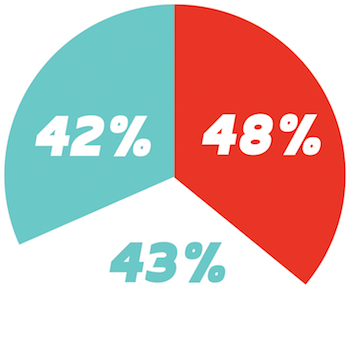Friday, April 2, 2021
Americans who are most resistant to receiving a COVID-19 vaccine cite a lack of critical information regarding vaccines’ safety and potential side effects, according to a recent study conducted by Philadelphia-based healthcare marketing agency LevLane and marketing research company MarketVision.
The study, which sought to gain insight into what’s driving Americans’ ongoing vaccine resistance and what can be done to overcome their hesitancy, discovered a surprising number of Americans remain resistant to being vaccinated: Overall, more than a quarter of all participants (28 percent) said they’re hesitant to receiving a COVID-19 vaccine, citing concerns surrounding medical privacy, levels of confusion or unfavorable reviews of the U.S. vaccine rollout.
 Among those frustrated by the U.S. rollout of COVID-19 vaccines, 48 percent blame the Federal Government, 43 percent blame their State Government and 42 percent blame President Trump. Among those frustrated by the U.S. rollout of COVID-19 vaccines, 48 percent blame the Federal Government, 43 percent blame their State Government and 42 percent blame President Trump. |
While this lack of trust presents a major challenge to federal, state and healthcare officials, the study identified key reasons for this hesitancy, suggesting what the government and healthcare leaders can do to overcome these concerns in an effort to get more Americans vaccinated. More than half (51 percent) of the study’s participants said they think the vaccines were developed too quickly. And almost the same number (47 percent) said they’re leery of potential side effects.
The study found that women, members of the Black community and members of the Gen Z generation are among those least likely to get a COVID-19 vaccine. Nearly half of the women surveyed (48 percent) said they wouldn't take a vaccine if one were offered today, compared to 30 percent of men who said they’d also refuse a vaccine. A similar number (40 percent) of African Americans said they’d turn down the vaccine if offered. Only 37 percent of Gen Z say they’d accept a COVID-19 vaccine.
Among those who think the vaccines were developed too quickly, nearly three-quarters (71 percent) are over the age of 65 (61 percent also identified as Baby Boomers and 54 percent identified as women). Among the respondents who said they’re unsure of side effects, 55 percent identified as Hispanic, 55 percent identified as women and 50 percent identified as Black.
Virtually every senior polled (100 percent) said they want to see more information regarding potential side effects, as did 71 percent of the Gen X members (ages 41-56) and 64 percent of female respondents.
More than half (58 percent) of Baby Boomers and 50 percent of seniors said they’d like to know more about the differences between current COVID-19 vaccine options.
Nearly half (47 percent) of the Black community said they want to know more about how long the vaccination process will take.
In total, more than a third of all respondents (39 percent) said they want to know more about how much immunity they’ll really get from a COVID-19 vaccine
LevLane and MarketVision’s “Vaccine Resistance Survey” polled 471 U.S. adults in March.